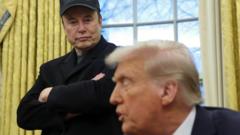Elon Musk, the billionaire CEO of Tesla and SpaceX, made headlines during his surprise visit to the White House, where he denied orchestrating a "hostile takeover" of the U.S. government. Standing alongside President Donald Trump, Musk defended his ambitious cost-cutting agenda as he faced a barrage of questions from reporters.
Trump has empowered Musk's newly formed Department of Government Efficiency (Doge) to implement significant reductions in the federal workforce, signing an executive order to grant the agency greater oversight and authority. This initiative, however, has drawn harsh criticism from Democrats, who have raised concerns about transparency and potential conflicts of interest inherent in Musk's dual roles as entrepreneur and government advisor.
Describing the planned government cuts as "common sense" rather than radical, Musk contended that the American people have called for substantial reform through their votes. "This is what democracy is all about," he stated, while simultaneously acknowledging the scrutiny that comes with his high-profile position.
As Musk addressed reporters, he maintained a lighthearted demeanor, donning a black "Make America Great Again" cap and joking with the audience. He argued that reducing federal expenses is vital for the country to maintain financial stability, asserting that many federal workers function as an "unelected, fourth, unconstitutional branch of government."
The backlash from opposition leaders has been intense. Senate Minority Leader Chuck Schumer condemned the idea of an "unelected shadow government" manipulating federal administration, pledging to obstruct Musk's proposed changes via legislative measures. Despite these challenges, Trump and Musk remain optimistic about advancing their agenda, although they face considerable hurdles in the courts.
Trump praised Musk's cost-reduction efforts, claiming potential savings upwards of $1 trillion could be uncovered, although no specific figures were provided. Meanwhile, critiques of Doge’s initiatives have highlighted concerns about their implications both domestically and internationally, particularly regarding the effects on agencies like the U.S. Agency for International Development (USAID), which recently experienced significant staff cuts following Musk’s directives.
A recent poll suggested that while many Americans support Musk's initiatives, they remain divided on the extent of his influence on federal policy. With Republicans currently holding a majority in Congress, Musk's endeavors to reshape the government budget and spending priorities are likely to face both political and legal challenges ahead.
As criticism mounts, Musk and the administration are grappling with questions about the potential ramifications of such comprehensive reductions on government efficacy and international aid, continuously asserting their belief in the necessity of their plans.

















